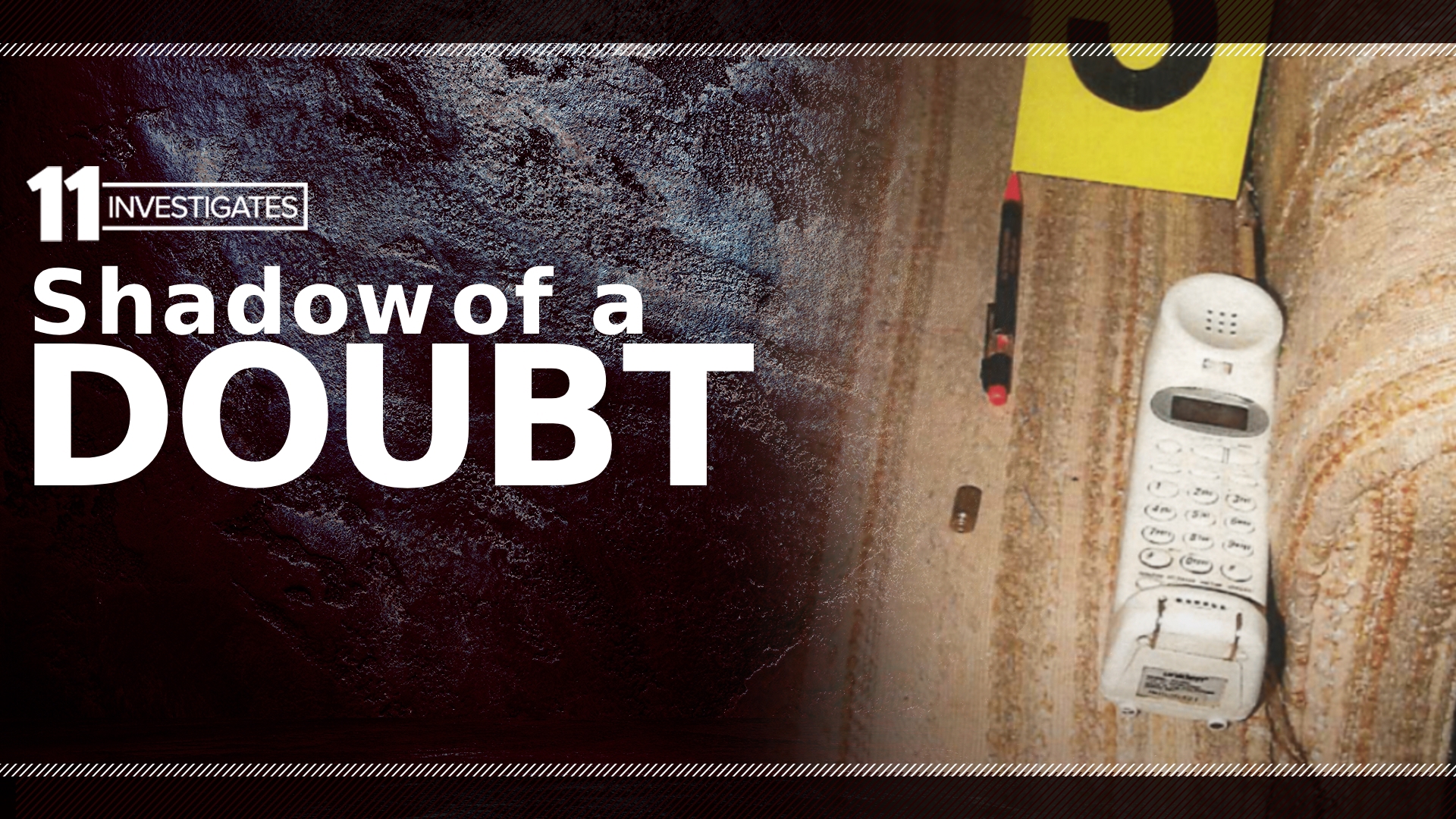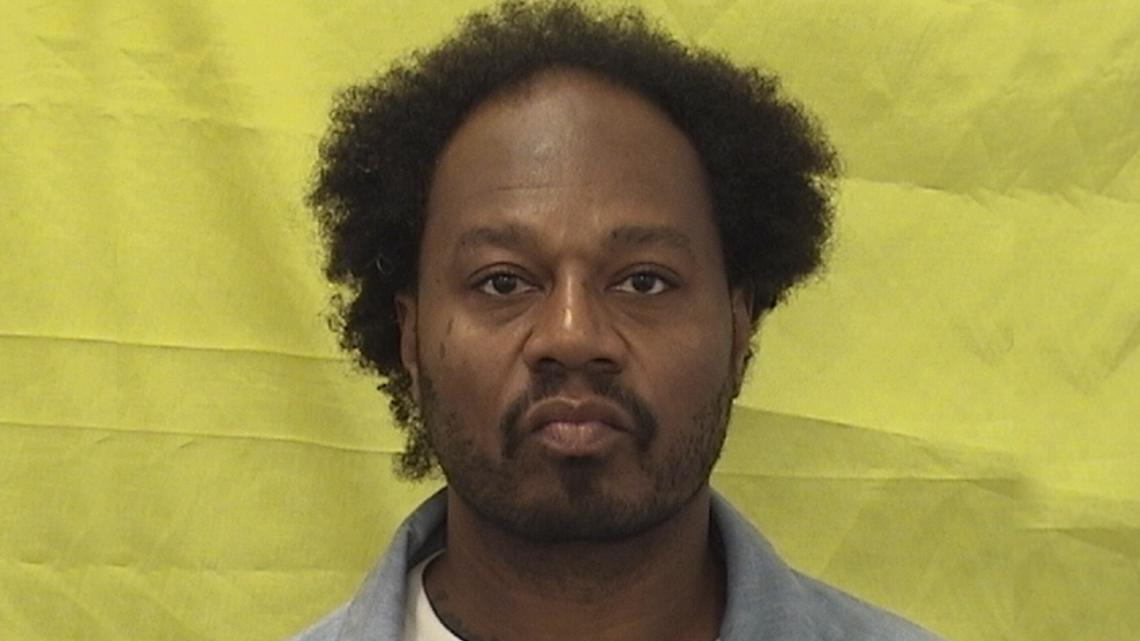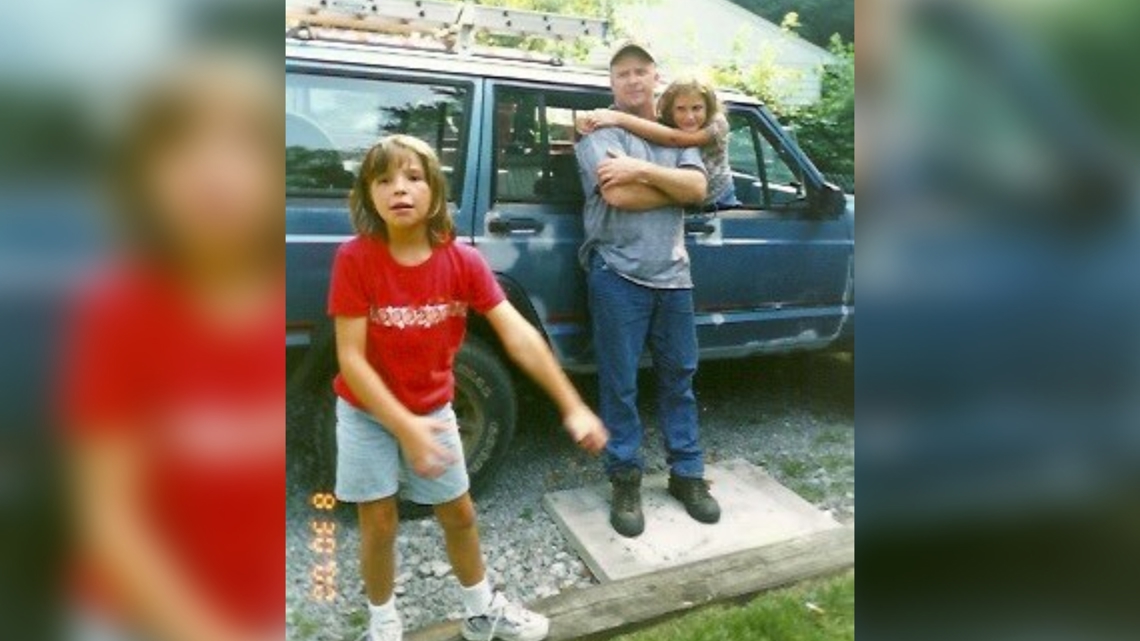Questions remain about phone calls, evidence and a man who maintains he's innocent | 11 Investigates: Shadow of a doubt
Evidence and a jailhouse call point to an alternative suspect in the 2004 murder of John Riebe. Is Eric Babos behind bars for someone else's crime?

This is the final part of a four-part series on the Dec. 15, 2004 murder of John Riebe. His friend, Eric Babos, was convicted of his killing, though Babos and his family continue to fight to prove his innocence.
RELATED: 11 Investigates: Shadow of a doubt
When Colton Webster was locked up in the Lucas County jail in 2011 for aggravated robbery, there was a fellow inmate who was really interested in his personal history.
Webster is the son of Eric Babos, who was convicted of killing Toledoan John Riebe in 2004 inside Riebe’s Talmadge Road home.
Riebe was killed on the afternoon of Dec. 15, 2004. He was shot seven times by a .380-caliber handgun. Every bullet found its mark, with the first or second bullet going through Riebe’s heart.
Police know from a series of phone calls from his home that Riebe was alive at 3:09 p.m. but that he was dead at 3:19 p.m., when his daughters, Jamie and Nicole, arrived home from school.
Beginning at 2:57 p.m., Riebe made multiple calls to try and get a check picked up from A-1 Heating. In a voicemail to his estranged wife, Riebe said there was someone in his home who wanted the money. In multiple calls, that man identified himself as Eric, John’s helper.
A jury believed "Eric" was Eric Babos and found him guilty on Aug. 5, 2005.
By 2011, the 18-year-old Webster also found himself with legal problems.
“When I got locked up, I was on the phone with my uncle and some guy kept walking back and forth behind me. After about five minutes, I get off the phone and this guy comes up to me and asks: ‘Are you Eric’s son?’” Webster said. “He's like, ‘Oh, I got a lot to tell you. Your dad did not do it. I was there. I was at the crime scene.’”
For 13 years, the man’s information has not been released.
And then one day, the man called 11 Investigates.
'I wasn't in the house, but I was there' The prison call
In two phone calls, 11 Investigates interviewed the man who approached Colton about what he knew about Riebe’s murder.
He agreed to be interviewed in the second phone call after 11 Investigates agreed to not use his name and to put a filter on his voice. He gave specific details about the murder and named a longtime associate. He, understandably, is concerned that releasing that information could result in his death.
He told us that he would occasionally sell Riebe drugs, but that he also would bring him prostitutes. One of Riebe’s known drug dealers was a man who was known on the streets as JR. His real name is Valynn Rodgers.


“I was picked up that day by JR. He claimed that John owed him some money and that he had owed him for a while,” the man told 11 Investigates. “I went in the house and John and JR got into an argument. It got animated really quick.”
The man said he went out to the car, which was parked in the front of the house.
“I hear gunshots. My stomach dropped. I knew someone got shot, but I didn’t know if John shot JR, or JR shot John,” he said. “JR exited the residence real fast, ran to the car and drove off. And I was like, ‘man, what happened in there? And he was like, ‘man, I don’t know, man. I got trigger-happy. He was playing with my money and I shot him. I killed him.'”
The man has a lengthy criminal record and had just gotten out of prison. He told us he was concerned about going back to prison.
“I was nervous," the man said. "If it was a murder, I worried that I was going to get an accessory to murder. I wasn’t in the house, but I was there.”
On the night of the murder, Babos and his friend, John Klawitter, told police of a party five days before the murder in which JR showed up at Riebe’s and allegedly pulled a gun.
When police asked Riebe’s daughters who could have killed their dad, they mentioned Babos, but they also mentioned JR.
But detectives Todd Slaman and Robert Colwell did not interview JR until Jan. 6, 2005, one week after Babos had been arrested.
There is no audio of that interview, but a few days later, detectives were told the man who talked to us wanted to talk to them.
Slaman and Detective Jeff Kozak of the Lucas County Sheriff’s Office talked to the man.
In testimony in Babos’ motion for a new trial on May 12, 2006, Slaman testified that he took no notes or recordings of the interview. He did not compile a report on the interview until a month before Babos’ 2006 hearing, more than a year after the event.
Kozak was asked during the hearing if he would have taken notes if it was his case and he responded that he would.
In the hearing, Slaman said that the man just wanted a deal and had no specifics.
The man disputed Slaman’s statement that he did not tape the interview. “I know he did," the man said. "I saw the recorder.”
As far as JR, the man told us: “JR is a dangerous individual.”
Valynn Rodgers Alias: JR
On the day of his murder, John Riebe was looking for one of his most reliable cocaine dealers – JR. According to phone records, Riebe and JR exchanged five different phone calls.
In his interview with police, JR said the men never connected that day, but at 12:50 p.m., JR called Riebe in a phone call that lasted for two minutes.
In trial testimony, Colwell said he was never able to determine where JR was on the day of the murder, though his father provided him an alibi. We also know from Colwell’s testimony that detectives asked JR if he carried a gun and he said he did not.
Colwell then was asked if he believed him. He said, "yes."
That is largely the reason that JR was dismissed as a suspect.
But JR had multiple weapon violations on his record. Two months after Babos’ trial, Rodgers was pulled over with a .380-caliber handgun, the same caliber that killed Riebe. It was tested and could not be identified as the murder weapon.
As far as Rodgers being honest with police, a 2007 court motion – in a separate weapons case – stated that Rodgers had four misdemeanor convictions in 10 years that involved dishonesty or false statements, including a conviction for giving false information to a police officer. At that point, there were two similar felony convictions. He was then convicted of that offense and sent to prison.
A review of his prison record shows that there have been 140 charges filed against him in Toledo Municipal Court. He is currently in prison on felony domestic violence charges from Allen County.
By comparison, Babos had no felonies on his record. He had a misdemeanor domestic violence, DUI, petty theft, and driving under suspension on his record.
Calls from the Riebe home A potential gamechanger
Police know that Riebe died around 3:15 p.m. on Dec. 15, 2004, because of that series of calls made from his home between 2:57 p.m. and 3:13 p.m.
One of the phone calls is of particular interest. At 2:57 p.m., Riebe calls his estranged wife, Lisa, asking if she will go pick up his check from A-1 heating. Riebe – and Babos – had recently completed a contracting project for the company and had a $500 check waiting for him.
Riebe then almost immediately calls her back at 2:58 p.m., saying someone is with him who needs that money.
But after the machine announces the time of 2:57 p.m. in the first call, a muffled voice can be heard in the background. At normal levels, it can’t be understood.
So 11 Investigates worked with The Vault Recording Studios in downtown Toledo to amplify the call.
The four people in the room agreed that it sounded like a Black male said “or you’ll die.” The two men who amplified the audio are Black and agreed, “that is definitely a Black guy.”
That is significant because there were four later calls to A-1 Heating.
In the first, Riebe asked office manager Daniel Boyle if he could come get his check.
At 3:07 p.m., a man who identifies himself as Eric, John’s helper, asks if he can pick up the check. He then hands the phone to Riebe.
Two later calls – at 3:09 p.m. and 3:13 p.m. – are handled by owner Bob Pfieffer.
In the last call, “Eric” demands his money.
About an hour later, A-1 Heating gets a phone call from Babos’ personal phone. Pfieffer again answers this call. Unlike the previous four calls, this call is not to A-1’s dedicated contractor line. It is made to a published number in the phone book. But Pfieffer testified in court that the same man made the 3:13 p.m. and 4:07 p.m. calls.
In a recent interview, Jerry Phillips, Babos’ defense attorney, took great issue with Pfieffer’s testimony.
“My feeling was that jurors would understand that it was a phone call where a stranger was talking to another stranger. Then you hear that voice a second time later. Can you say that that is the same person? I just assume, based on my experience with phone calls, that I can't identify that person,” Phillips said. “It just seemed to me that that witness potentially had been told that 'this for sure is the guy. This is what we have, and he's for sure the guy. We just need you to confirm this.'”
Babos told us that the 4:07 p.m. call is the first time he had ever talked to Pfieffer. Babos had talked to Jamie Riebe minutes earlier and she told him that her dad was sick and couldn’t come to the phone.
“I asked Pfieffer, ‘Did you hear something bad happened to John?’ And he's like, ‘No, and I'm not giving a check to anybody but him.’ I thought that was sort of weird,” Babos said. “But later I learned about all the other calls, so now it all makes sense to me now that I've got the full picture.”
11 Investigates reached Boyle. We asked him if he believed he was talking to a Black man and he responded that he did. Surprised, we asked if he understood that Babos is a white man and he responded, “I don’t know if it was Eric Babos, but I believed it was a Black man.”
He then contended that he testified to that fact, but we have reviewed trial and appellate transcripts and he was never asked about the ethnicity of the caller.
11 Investigates found three jurors from the trial.
When presented with this information, two jurors did not remember enough about the trial to comment about the call.
The other juror said that it could have made a difference in deliberations if the jury had known Boyle believed the caller was Black.
Problems with evidence Shadow of a doubt
The 11 Investigates team has reviewed thousands of pages of police and lab reports and court testimony in compiling this series.
In addition, we have conducted more than a dozen interviews. Detectives Slaman and Colwell were contacted. We had a 10-minute conversation with Colwell, but he did not want to give any official comments since he retired from Sylvania Township several years ago.
The prosecutor’s office did not agree to an interview but provided a statement in which it cited Babos’ multiple appeals and said it would be willing to review any new evidence or statements.
But we found several additional concerns with the evidence used to convict Babos:
- On the night of the murder, Babos’ hands were tested for gunshot residue and it was negative. The prosecutor argued he could have washed his hands, but additional particles were found on his hands when tested. Two weeks after the murder, the flannel shirt he was wearing on Dec. 15 was sent to BCI for GSR testing. It was determined that GSR was found on his left sleeve. Later in 2005, the FBI discontinued GSR testing, citing multiple studies that found the residue was easily transferrable and contamination was possible inside police buildings or even the lab.
- The prosecution had the issue of attempting to explain how Babos made the 3.8-mile trip to Riebe’s home from his brother’s house on Westacre Lane, where he was helping with a remodeling project. Babos’ father dropped him off at 11 a.m. and his brother, Greg, picked him up around 4 p.m. There was a vehicle on the property, but it had not run for years. Detectives did not get a search warrant to search the Westacre Lane property, but they testified that they looked through a window and saw bicycles. Eric and Greg agreed there were a couple of bikes – Eric’s nephew’s small BMX bike and Eric’s old bike – and that all the tires were flat and the chains were not attached.
- The scene of the crime contained an ashtray full of discarded cigarettes. Those cigarettes were not sent for testing, with Colwell testifying that Eric was often in the house and it was expected that his DNA would be in the house. But it is also possible that the DNA of an unknown suspect could have been discovered. In addition, the phone was not dusted for fingerprints, even though the phone calls were crucial to the case and Riebe and the killer passed the phone back and forth several times.
- Testimony that did sway the juror we spoke with was that of Kathryn Boswell, the mother of Babos' son Colton. She testified that she talked to Babos and asked him why police believed he was a suspect. She said he responded that it was because he was the last person to see him alive because he worked with him. But she told 11 Investigates that she did not mean that he literally was the last person to see him alive, but that he was the last person to work with him – the day before. She testified that he told her he did not do it.
- The night of the murder, Babos and his friend, John Klawitter, told police about the party incident with JR. At trial, Colwell testified that no one confirmed that JR had a gun. In the audio we listened to, Klawitter clearly said that JR pulled out a gun. When pressed by 11 Investigates on whether he ever recanted that conversation or if he doubted what he saw, he said that he never recanted and that he is positive he saw a gun.
'I just want people to know I'm innocent' What comes next
Once a person is convicted, the mountain is steep to be cleared. Though much of what we found could seemingly sway a jury or raise reasonable doubt, it’s unclear if any of it would be considered new evidence.
11 Investigates presented Riebe’s daughters, Jamie and Nicole, with almost all of what we found and they are convinced that Eric Babos killed their father.


Babos is eligible for parole in 2027, but is resigned to spending at least 30 years in prison unless he gets relief from the court.
“I’m hoping for an evidentiary hearing," Babos said. "I'm hoping that Judge Gary Cook will listen to everything we have ...everything in a big ball.”
After 11 Investigates provided some of our findings to the Ohio Innocence Project, they interviewed Babos and are actively working on his case.
“I just want people to know I’m innocent," Babos said. "And I'm never going to stop until I prove it.”

